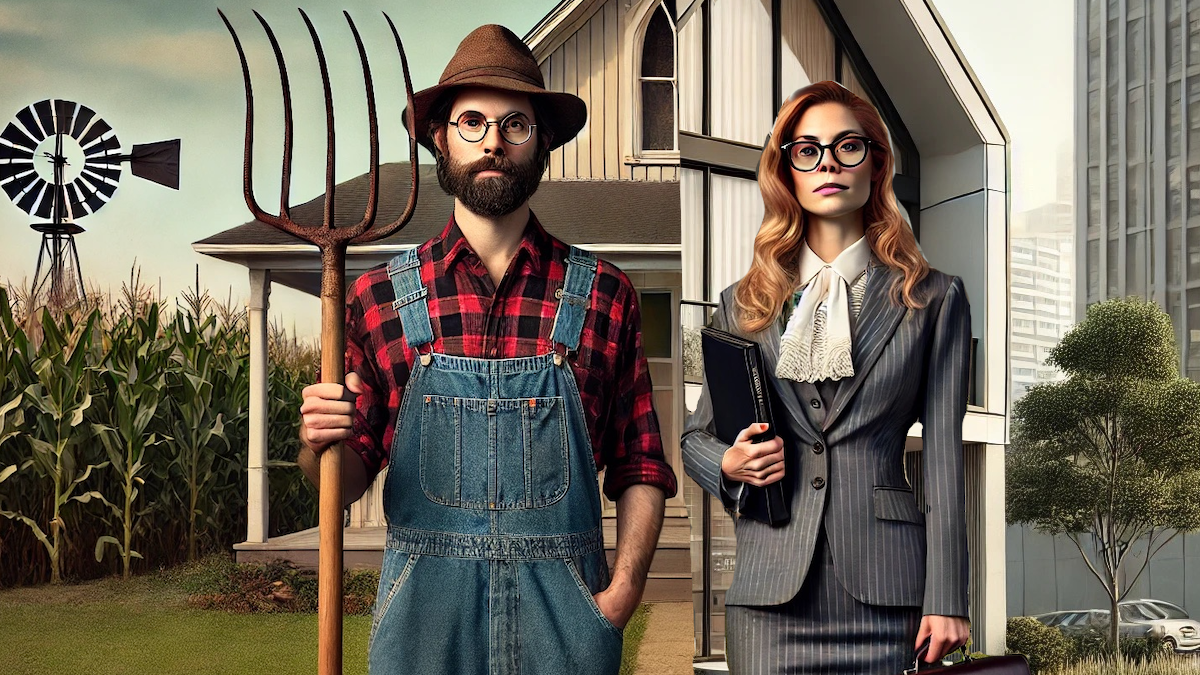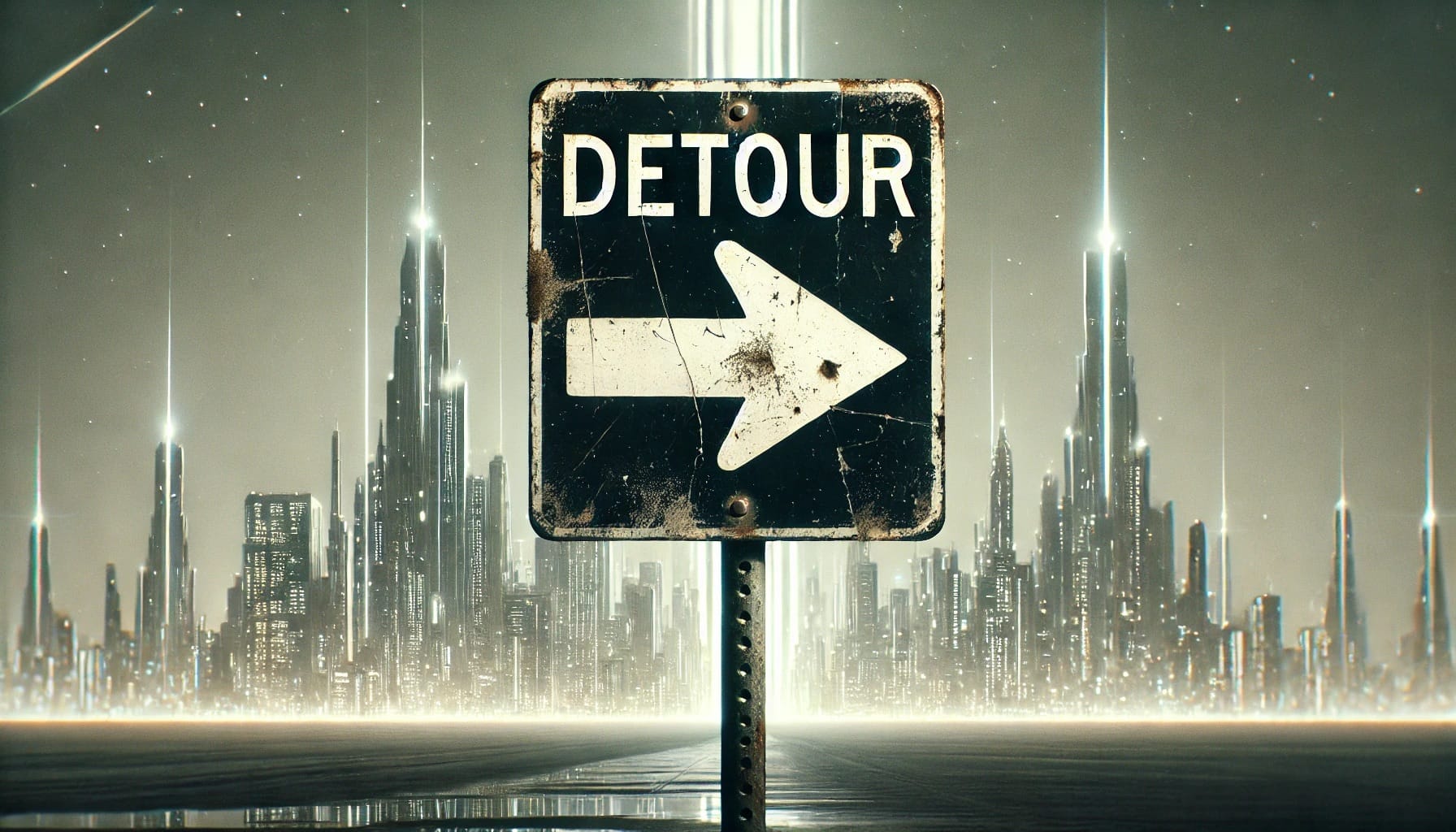An early post on this blog quoted Robert Reich about how most progressives live in cities and on the coasts, and most regressives live in rural areas far removed from ports and cities. It’s a widely noted pattern. “Our problem is they [the regressives] have disproportionate political power, and are determined to hold onto it as long as they can.”
Since compiling Reich’s sentiment (and the one from Connor Wood — whatever happened to him? — in the post previous to that one), I’ve come to understand these differences as aspects of human nature — the rural, or tribal, vs the urban, or continental. As explored by numerous books in psychology and the mind that I’ve read and blogged about in the decade since. And my thesis is that, as the world’s population expands, problems that must be solved through cooperation of all nations will require that urban, or continental, perspective and cooperation, while the priorities of the rural and tribal folk — like those about to take control of the US government — will just make everything worse. They think about short-term benefits, and ignore long-term consequences, when they won’t be around to suffer. (While apparently not minding that their grandchildren will.)
Here’s just the latest take on this issue.

OnlySky, Adam Lee, 2 Dec 2024: The United Cities and Ruralities of America, subtitled “It’s a two-state solution for our own intractable conflict.”
As Abraham Lincoln put it in his famous speech quoting the biblical aphorism, America is a house divided against itself. We’re not one united country, but two very different nations penned up within the same borders.
Worse yet, those two nations are at each other’s throats. We have drastically different politics and philosophies. We’re mutually suspicious, resentful and hostile. Our political divide has grown into a chasm pitting state against state, household against household, family against family.
It’s no wonder our national mood is so angry, bitter and bleak. We can’t endure like this forever. Is there a way out? Do we need a peaceful national divorce?
And so on.
The line of demarcation isn’t between states, but between urban and rural areas within each state. Every large state has liberal cities and a conservative countryside. This is true in deep-blue states like New York and California and blood-red states like Texas. The only thing that differentiates the states is which region dominates its overall politics. Even then, the “domination” is more often 52-48 than 90-10.
You can debate why the urban-rural pattern holds so consistently. One theory is that cities attract a multicultural population. This gives urban residents firsthand experience of diverse cultures and beliefs, making them more cosmopolitan, tolerant and broad-minded, as opposed to isolated and insular areas that tend to be suspicious of outsiders and resistant to change.
Or, he suggests, because cities are where the high-paying jobs are. But why would that be? Because the smart people aren’t “suspicious of outsiders and resistant to change,” I would say. Does he have a solution?
Here’s my modest proposal.
Take, say, the five largest metro areas in each state. They would become a new sovereign entity—a coalition of cities like the medieval Hanseatic League or the Décapole. The rest of the state would be a separate sovereign entity. Both of these new polities would have the power of self-governance over their own territory and their own residents.
Each of these new entities would then elect representatives at the national level. We’d have not one, but two Congresses. Urban America would elect one, and rural America another. Each region could enact its own laws, governing itself as its inhabitants see fit.
The cities could ban guns, and the rural areas could ban abortion. The cities could welcome immigrants, and the rural areas could bar the doors against them. The cities could enact socialized health care, and the rural areas could privatize everything. We’d effectively become two Americas, but nested within each other. It’s the cleanest way to carve our politics at the joints.
I’m not familiar with those historical models, nor the government of Northern Ireland, which he cites.
Even with this arrangement, we’d still be tied to each other by links of economic interdependence. The rural areas, by definition, would produce most of the food and natural resources. Meanwhile, the cities would have the most people, the most economic power, and the prosperous industries like tech that benefit from concentrated talent pools.
There would still be cross-border agreements to be made, and so on. Yet here’s the pay-off:
Best of all, we’d have a true test of which of these governing philosophies works better in the real world. Right now, each side in our politics claims credit for national successes while blaming failures on the other. These debates cloud the answer to which politics is truly better for the people who live with it.
A clean separation would cut through this haze of confusion. If one of these new entities—call them the United Cities of America and the United Ruralities of America—thrives and prospers, while the other declines, it would be undeniable proof of which way is the better way to live.
Of course, we already have loads of statistics about various measures of health, for example, in red states vs. blue states. Separating stats by rural areas vs urban areas would make the contrast even more stark, I suspect.
\\\
Another perceptive essay from the same site.

OnlySky, Dale McGowan, 3 Dec 2024: The twist ending of history, subtitled “On the strange, seductive lure of authoritarianism.”
The twist happened after Francis Fukuyama famously declared an “end of history” in the 1990s, after the Soviet Union had fallen and democracy seemed to be on an inevitable rise around the world.
In 1992, political scientist Francis Fukuyama declared that we had reached the end of history. Not that events had stopped happening, but that the evolution of government—the struggles between monarchy, socialism, fascism, and democracy—had ended with the final and lasting triumph of liberal democracy. Humanity, he said, had reached “the end point of mankind’s ideological evolution and the universalization of Western liberal democracy as the final form of human government.”
Fukuyama was not the first to suggest the idea. Hegel, Marx, Mill, and Tocqueville also argued that history was evolving in the direction of greater individual freedom and democratic societies, and that an endpoint could be envisioned at which democracy will have exhausted and defeated its competitors—a version of the myth of progress.
That last is a link to the piece I discussed in this post on 14 November.
Fukuyama was the first to claim that the end of history was not in the future, but directly under his feet.
It certainly felt like that in 1992. The Soviet Union had dissolved with shocking speed, taking the Berlin Wall with it. Several former Soviet satellites and republics adopted democratic governance and market economies and began knocking on the doors of the EU or NATO or both. New multiparty elections took place in a number of Latin American and African nations. Argentina’s military junta had buckled in 1983, and Chile returned to democracy in 1990 with the ouster of Pinochet.
But it took less than a decade for the wheel of history to grind back to life.
That is, 9/11, and so on… He cites Anne Applebaum, Timothy Snyder, Francis Fukuyama, who all hope for an eventual return to democracy.
Although I want them to be wrong, the anthropologist in me is increasingly convinced that they are not. If history is indeed ending, a much stronger argument can be made for authoritarianism than democracy as the lazy resting place for it to finally lay its weary head.
As I’ve said, both democracy and science are hard work. They challenge presumptions of human nature that will always be with us. They can be seen as experiments among parts of human society that are ignored by many other parts of human society and resisted by even parts of societies that have tried them out. And these experiments might fail. The writer understands this:
Lazy is the key word here. Social systems, like biological systems, tend in the long run toward paths of least resistance. To call liberal democracy the final arrival point of human government is to suggest that it requires less energy to maintain democracy—that it is (to use a problematic word) a more “natural” condition than authoritarianism. I can perhaps see that argument on a small scale. Bands of 15 to 20 individuals on the savanna may more naturally fall into egalitarian systems. But once you get well above the Dunbar number, or Bernard-Killworth, or whatever threshold you prefer for a maximum number of meaningful human relationships, we begin to lose the ability to grasp the whole community and to trust its functioning.
So the tribal way of life is more egalitarian? Sure — just as a family is relatively egalitarian — but there are phases of social organizations from small tribes to larger groups to nations.
Lee goes on to discuss how democracy might recover from autocracy. Economics; digital technologies; …and the need to react to climate change.
As living conditions degrade in the US and Europe, an unprecedented torrent of desperate populations will move north in their millions from the even less livable tropics. It takes little imagination at this point to imagine an authoritarian rallying the homeland population against an invading hoard, especially as our own resources dwindle and conditions worsen. Preserving democratic institutions would be hard enough in that situation. Restoring them would be impossible.
Yet the bottom line is:
We climb out of tyranny with difficulty. We fall back easily. If we lose our democracy now, it will be much harder, if not impossible, to get it back later. Whatever we can do, now is the time.
\\\
Short items.
Another piece about the cluelessness of those who want to shrink the government.

The Atlantic, Annie Lowrey, 4 Dec 2024: The American People Deserve DOGE, subtitled “America has an efficiency problem, but Elon Musk is not the man to fix it.”
Here’s a sample passage that identifies the problem and the absurdity of the proposed solution:
Our government has no competition. It operates on behalf of its citizens, scaling to their needs and desires. It prints its own currency, the world’s reserve currency, making its financial constraints orthogonal to those of households or firms. It proffers goods and services too important to leave to the markets. Neither Musk, Ramaswamy, nor Trump seems to appreciate this, instead treating the federal agencies like something to McKinsey-consult right before Christmas—to cut, gut, and abandon to the next investor, who might be able to squeeze out some profit.
Their misunderstandings are elementary, absurd. Consider Musk’s childlike proposal to slash $2 trillion from the country’s expenditures. There isn’t $2 trillion of wasteful nonsense to cut. Cutting $2 trillion means cutting Social Security, Medicare, and military spending, not public-television grants and research funds. The risk is existential for untold numbers of American seniors and for the standing of the United States as a defense superpower.
\\
Another example of cluelessness. The ACLU is not funded by the government. (It’s a private organization — to which I donate every year.)
JMG, 4 Dec 2024: Musk Calls For “Defunding” The ACLU Over Trans Case
\\
And how Fox News relies on legacy media, or mainstream media, more than they acknowledge.
Washington Post, 3 Dec 2024: Who still trusts legacy media? Fox News, that’s who., subtitled “At the same time the right-wing network is draining trust from legacy media, it’s relying on legacy media’s reporting.”
With many examples. Is this because Fox News doesn’t have their own reporters, and only exists to provide spin? I don’t know.





